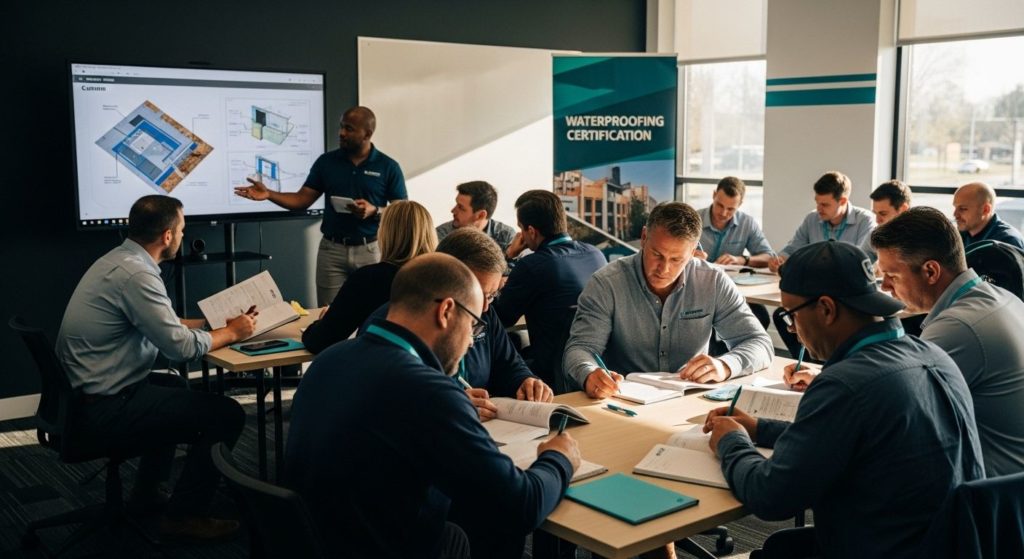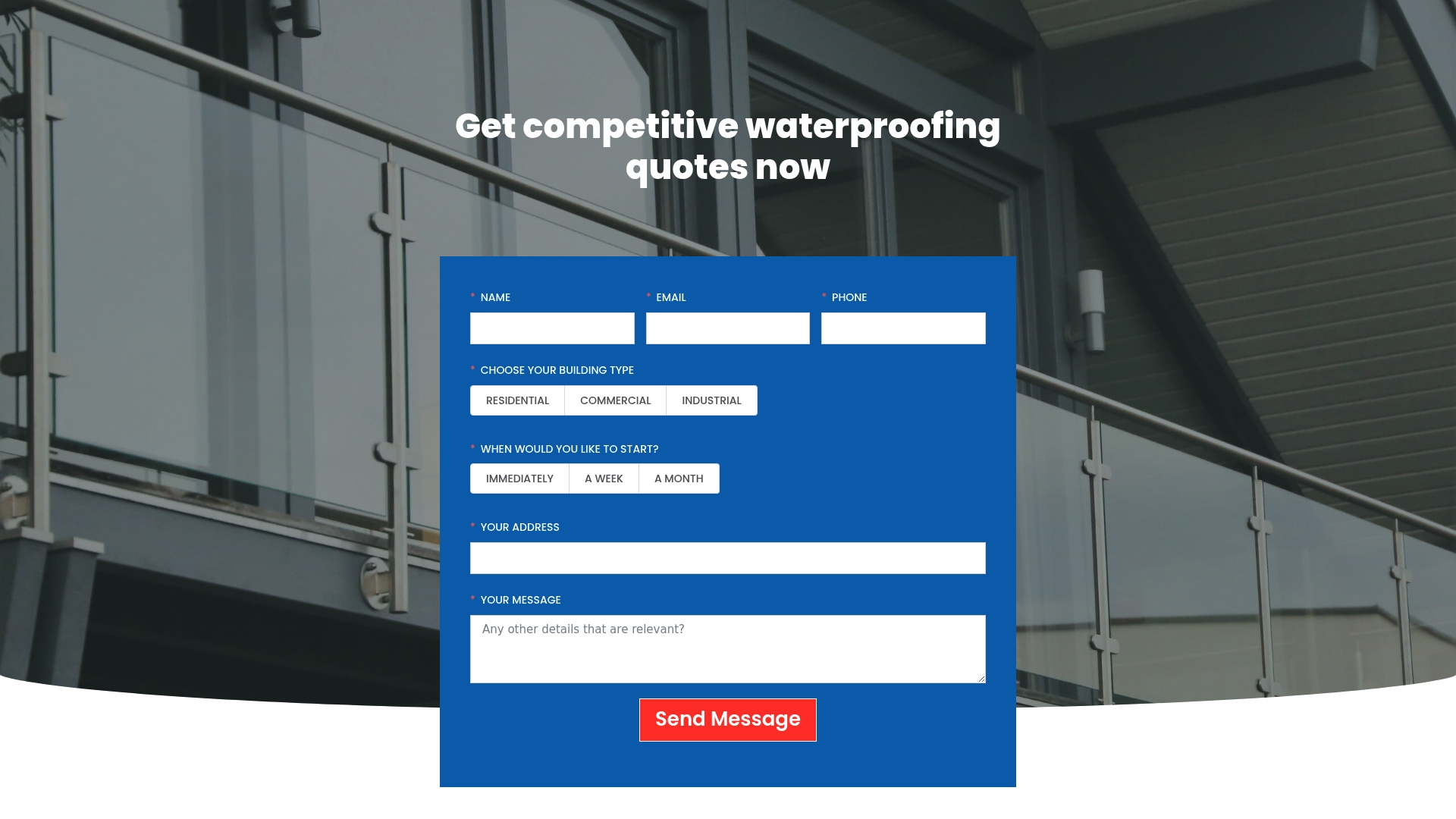Waterproofing certification has become one of the top credentials for modern construction. Properties with certified waterproofing can face up to 80 percent fewer moisture-related repairs, saving thousands over the building’s life. Surprising as it sounds, the real purpose of this certification is not just stopping leaks. It is about proving a level of expertise that can actually protect the entire value and future of your property.
Table of Contents
- Defining Waterproofing Certification And Its Purpose
- The Importance Of Waterproofing Certification For Property Owners
- How Waterproofing Certification Works: The Process Explained
- Key Concepts And Standards In Waterproofing Certification
- Real-World Applications And Benefits Of Waterproofing Certification
Quick Summary
| Takeaway | Explanation |
|---|---|
| Certification ensures professional expertise. | Waterproofing certification validates a professional’s skills and knowledge in advanced moisture management strategies, ensuring quality work. |
| Protects against significant financial risks. | Certified professionals help prevent costly water damage, which could lead to expensive repair bills and lower property value. |
| Rigorous training is essential for certification. | The certification process includes extensive training in material science, application techniques, and risk management protocols. |
| Certified professionals implement effective solutions. | They have advanced knowledge and practical skills for managing complex water intrusion challenges across various construction types. |
| Continuous professional development is crucial. | Obtaining certification reflects a commitment to staying updated on the latest industry standards and techniques in waterproofing. |
Defining Waterproofing Certification and Its Purpose
Waterproofing certification represents a professional recognition and standardised validation of technical skills and expertise in preventing water intrusion and moisture damage across various construction environments. This certification demonstrates an individual’s comprehensive understanding of advanced waterproofing techniques, materials, application methods, and industry best practices.
What Constitutes Waterproofing Certification
A waterproofing certification is a formal credential that validates a professional’s competence in designing, implementing, and managing water-resistant solutions for buildings and infrastructure. According to South African Qualifications Authority, these certifications typically encompass rigorous training programmes that cover critical aspects of waterproofing technology.
Key components of a comprehensive waterproofing certification include:
- Advanced technical knowledge of waterproofing materials
- Understanding substrate preparation techniques
- Comprehensive risk assessment skills
- Compliance with national building standards
- Practical application and installation methodologies
Professional Significance and Industry Standards
Waterproofing certification goes beyond mere technical training. It serves as a critical benchmark for quality assurance in construction and property maintenance. Pro Waterproofing recognises that certified professionals bring substantial value through their validated expertise, ensuring projects meet stringent industry requirements and minimise potential water damage risks.
Professionals who obtain waterproofing certification demonstrate:
- Commitment to continuous professional development
- Expertise in advanced moisture prevention techniques
- Understanding of complex architectural and engineering challenges
- Ability to implement cutting-edge waterproofing solutions
Through formal certification, practitioners prove their capability to protect structures against water infiltration, ultimately safeguarding property investments and maintaining structural integrity across residential, commercial, and industrial settings.
The Importance of Waterproofing Certification for Property Owners
Waterproofing certification represents a critical safeguard for property owners, providing assurance of professional expertise and comprehensive protection against potential water damage. The implications of selecting a certified waterproofing professional extend far beyond simple maintenance, directly impacting property value, structural integrity, and long-term financial investment.
Risk Mitigation and Financial Protection
Property owners face substantial financial risks when water damage occurs. According to the National Home Builders Registration Council, uncertified waterproofing work can lead to significant structural complications that may cost exponentially more to repair than initial preventative measures. Certified professionals bring structured expertise that minimises these potential financial vulnerabilities.
Key financial risks mitigated by certified waterproofing include:
- Preventing extensive structural damage
- Reducing potential mould and moisture-related health hazards
- Minimising long-term repair and restoration expenses
- Protecting property market value
- Ensuring compliance with insurance requirements
Technical Expertise and Quality Assurance
Certified waterproofing professionals undergo rigorous training that equips them with advanced technical knowledge beyond basic application techniques. Pro Waterproofing understands that certification demonstrates a comprehensive understanding of complex moisture prevention strategies, substrate analysis, and advanced material compatibility.
The hallmarks of a certified waterproofing professional include:
- Advanced diagnostic capabilities
- Precise material selection skills
- Comprehensive understanding of building science principles
- Ability to develop customised waterproofing solutions
- Commitment to ongoing professional development
By prioritising certification, property owners effectively transfer technical complexity and risk management to highly trained specialists who can guarantee superior protection for their most valuable asset.
This table presents the primary financial risks faced by property owners in relation to waterproofing and illustrates how certified professionals help mitigate each risk.
| Financial Risk | Impact on Property | How Certification Addresses It |
|---|---|---|
| Structural Damage | Costly repairs, potential failure | Prevents water intrusion and structural compromise |
| Mould and Moisture Health Hazards | Health risks, remediation costs | Ensures correct installation, minimising moisture |
| Long-term Repair and Restoration Costs | Ongoing maintenance expenses | Uses advanced methods to ensure lasting solutions |
| Loss of Property Market Value | Reduced resale or rental value | Guarantees quality, maintaining investment worth |
| Insurance Compliance Issues | Claims denied, higher premiums | Ensures standards are met, aiding insurance claims |
How Waterproofing Certification Works: The Process Explained
Waterproofing certification is a structured professional pathway designed to validate technical competence, ensure industry compliance, and maintain high standards of moisture protection expertise. This comprehensive process transforms skilled practitioners into recognised professionals with demonstrable capabilities in advanced waterproofing technologies.
Training and Educational Requirements
The certification journey begins with rigorous educational programmes that cover theoretical knowledge and practical skills. According to Agrément South Africa, professionals must demonstrate comprehensive understanding of technical principles, material sciences, and application methodologies specific to waterproofing environments.
Critical educational components typically include:
- Advanced substrate analysis techniques
- Material compatibility assessment
- Moisture dynamics and prevention strategies
- Building science principles
- Risk management protocols
Professional Assessment and Validation
Pro Waterproofing recognises that certification involves multiple stages of professional evaluation beyond initial training. Candidates must typically undergo practical assessments, written examinations, and comprehensive skills demonstrations that validate their technical proficiency and industry readiness.
Key validation processes encompass:
- Practical skills assessment
- Technical knowledge examinations
- Portfolio review of completed projects
- Professional reference verification
- Compliance with industry safety standards
Through systematic evaluation, waterproofing certification ensures that professionals possess not just theoretical knowledge, but proven practical expertise in delivering high quality moisture protection solutions across diverse construction environments.
The following table summarises and compares the core elements involved in obtaining waterproofing certification and highlights how these requirements ensure quality and industry compliance.
| Certification Requirement | Description | Assurance Provided |
|---|---|---|
| Rigorous Training Programmes | Comprehensive instruction in material science and moisture prevention | Ensures up-to-date technical expertise |
| Practical Skills Assessment | On-site evaluations of real-world application proficiency | Validates hands-on competency |
| Technical Knowledge Examinations | Written tests covering theory, standards, and advanced techniques | Confirms comprehensive subject mastery |
| Portfolio Review of Completed Projects | Evaluation of previous professional work for quality and standards | Demonstrates real project experience |
| Reference and Safety Standards Verification | Checks of professional references and compliance with safety protocols | Confirms industry trust and diligence |
Key Concepts and Standards in Waterproofing Certification
Waterproofing certification operates within a complex framework of technical standards, regulatory requirements, and professional competency benchmarks that ensure systematic quality control and comprehensive moisture protection strategies. These standards represent a sophisticated approach to managing water intrusion risks across diverse construction environments.
Regulatory and Technical Standards
The foundation of waterproofing certification rests on stringent technical standards that define professional practice. According to Agrément South Africa, these standards encompass comprehensive guidelines for product evaluation, installation techniques, and performance expectations.
Critical regulatory standards typically address:
- Material performance specifications
- Installation methodology requirements
- Environmental compatibility assessments
- Durability and long-term performance metrics
- Structural integrity considerations
Professional Competency Frameworks
Pro Waterproofing recognises that certification standards extend beyond technical knowledge to encompass broader professional competencies. These frameworks evaluate practitioners based on comprehensive skill sets that integrate theoretical understanding with practical application.
Key professional competency elements include:
- Advanced diagnostic capabilities
- Strategic problem solving skills
- Technical communication proficiency
- Comprehensive risk management approaches
- Continuous professional development commitment
Through meticulous standardisation, waterproofing certification establishes a robust mechanism for maintaining professional excellence, ensuring that certified practitioners possess the necessary expertise to deliver high quality moisture protection solutions across complex architectural environments.
Real-World Applications and Benefits of Waterproofing Certification
Waterproofing certification transforms theoretical knowledge into practical solutions across diverse construction environments, delivering tangible benefits that extend far beyond basic moisture protection. This professional accreditation ensures systematic approaches to managing complex water intrusion challenges in residential, commercial, and industrial settings.
Practical Implementation Across Construction Sectors
Certified waterproofing professionals bring specialised expertise to various construction domains. According to Agrément South Africa, certification validates the ability to implement advanced moisture management strategies across different architectural contexts.
Key application areas include:
- Residential building foundations
- Commercial roof systems
- Industrial storage facilities
- Underground parking structures
- Structural rehabilitation projects
Economic and Structural Protection Benefits
Pro Waterproofing recognises that waterproofing certification delivers substantial economic advantages by preventing potential water damage. Certified professionals provide strategic interventions that protect property investments and minimise long-term maintenance expenses.
Significant economic benefits encompass:
- Reduced structural repair costs
- Enhanced property market value
- Extended building lifecycle
- Minimised insurance claim risks
- Prevention of moisture-related health hazards
Through rigorous professional standards, waterproofing certification ensures comprehensive protection, transforming moisture management from a reactive maintenance approach to a proactive strategic investment in structural integrity and asset preservation.
Secure Your Investment with Certified Waterproofing Experts
Worried about the risks highlighted in our guide to waterproofing certification, such as costly water damage, insurance headaches or improper applications? When you choose uncertified or inexperienced contractors, you potentially expose your property to these dangers. Our team at Pro Waterproofing understands that ensuring your chosen specialists are truly certified is the only way to safeguard your building’s structure and your financial peace of mind.
Now is the perfect moment to turn knowledge into action. Visit our Uncategorized – Pro Waterproofing section to explore more guidance, or use our website for fast, expert help. Request a quote through Pro Waterproofing and feel confident knowing you are working with fully certified professionals dedicated to top standards. Start protecting your property today and enjoy the benefits of proven expertise.
Frequently Asked Questions
What is waterproofing certification?
Waterproofing certification is a formal credential that validates a professional’s expertise in implementing water-resistant solutions to prevent water intrusion and moisture damage in buildings and infrastructure.
Why is waterproofing certification important for property owners?
Waterproofing certification provides assurance of a professional’s competence, ensuring that proper measures are taken to protect properties from potential water damage and associated financial risks.
What does the waterproofing certification process involve?
The process typically includes rigorous training programmes covering theory and practical skills, followed by assessments such as practical skills evaluations, technical examinations, and portfolio reviews to validate the professional’s expertise.
How does waterproofing certification ensure quality and compliance in construction?
Certification helps establish stringent standards for professionals by requiring knowledge of regulatory guidelines, material performance specifications, and advanced moisture management techniques, thereby ensuring consistent quality and compliance across projects.




